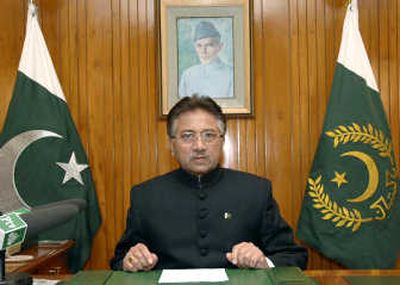Musharraf declares an end to emergency

ISLAMABAD, Pakistan – President Pervez Musharraf lifted emergency rule Saturday, six weeks to the day after he suspended the constitution and fired most of the Supreme Court justices.
In a speech to the nation Saturday night, Musharraf said his imposition of emergency rule had succeeded in saving the country from an unidentified “conspiracy” against democracy in Pakistan.
“I say it with pride that the process towards democracy, which had been derailed, has now been put back on track,” he said.
But his political opponents vigorously disagreed, saying the president had succeeded only in saving himself.
The decision to end the emergency had little tangible impact. Numerous top judges remained under house arrest Saturday, a restrictive new code of conduct continued to hobble the news media, and the nation hurtled toward parliamentary elections early next month that are widely expected to be rigged.
But an end to the emergency had been a key demand of the United States and other Western countries. The Bush administration had pressured Musharraf to take a series of steps to prove he was serious about returning the country to democracy, a list that included scheduling elections and resigning as army chief – both of which he has done.
Before lifting the emergency Saturday, Musharraf enacted constitutional amendments designed to provide legal cover for his actions. Among them is a provision stating that his legal maneuvering since Nov. 3 “shall not be called in question by or before any court.”
Since imposing the emergency, Musharraf has consolidated his control, with his government rounding up thousands of dissidents and violently suppressing protests. While most of the political prisoners have been released, a few – including key leaders of the lawyers’ movement – are still being held.
Saturday’s amendments are unlikely to deter Musharraf’s rivals from using any leverage they gain in next month’s elections to try to punish him: Opposition politicians have said they will push to have Musharraf impeached, and some have vowed to pursue treason charges against him.
But even critics concede that the emergency has worked for Musharraf – at least in the short term. At the time of the announcement, the Supreme Court was hearing a challenge to his eligibility to serve another term as president. Many, including members of Musharraf’s inner circle, expected the court to rule against him.
Now the court is packed with Musharraf loyalists, who have already given the president their blessing for a new term that lasts until 2012. The opposition, meanwhile, has been unable to mount a united front to challenge him.